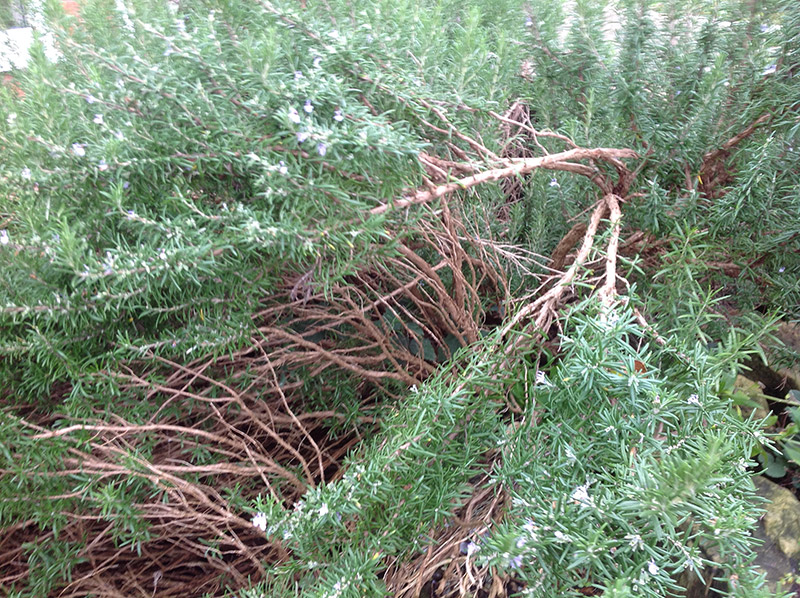 Rosmarinus officinalis is a common household plant grown in many parts of the world. Used for flavouring food, a beverage drink, in cosmetics and as a preservative in the food industry due to anti-oxidant/ anti-microbial properties.
Rosmarinus officinalis is a common household plant grown in many parts of the world. Used for flavouring food, a beverage drink, in cosmetics and as a preservative in the food industry due to anti-oxidant/ anti-microbial properties.
Folk Medicine
Used as an anti-spasmodic in renal colic and dysmenorrhoea, analgesic, anti-rheumatic, carminative, diuretic, expectorant, in relieving respiratory disorders, to stimulate hair growth and for anti-epileptic effects. Rosemary extract relaxes smooth muscles of trachea and intestine and stimulates bile production, liver protective and anti-tumour activity.
Modern Science Shows
The chemical constituents include polyphenol tannic acid and rosmarinic acid, similar to caffeic acid in coffee, flavonoids and volatile oils, phenolic terpenes notably carnosol and carnosic acid. Rosmarinic acid is well absorbed from gastrointestinal tract and skin and has potential in treatment or prevention of bronchial asthma, spasmogenic disorders, peptic ulcer, inflammatory diseases, liver-toxicity, atherosclerosis, ischaemic heart disease, cataract, cancer and poor sperm motility.
It is used for problems involving central nervous, cardio vascular, genito-urinary, reproductive and respiratory systems and liver treatments. The oil is used in oils and lotions for the treatment of arthritis, gout, muscular pain, neuralgia, wounds and rubbed into hair to stimulate the bulbs for renewed activity, to prevent premature baldness.
- Anti-Bacterial: Against drug resistant strains of infections from respiratory tract, abdominal cavity, urinary tract, skin and hospital equipment; also oral streptococcal and enterococcal microorganisms.
- Anti-Inflammatory: Rosmarinic acid inhibited lung inflammation from diesel exhaust particles in vivo. Carnosic acid has anti-oxidant, anti-inflammation, anti-adipogenic properties useful in insulin resistance, which is linked to low-grade chronic inflammatory response. Carnosol suppressed pain and inflammation from formalin injection in mice. Rosemary extract decreased pain in arthritis subjects and C-reactive protein, inflammatory marker, in patients with rheumatic disease.
- Anti-Oxidant: Free radicals are related to inflammation, aging, and carcinogenesis. Smelling rosemary decreases stress hormone cortisol and protects against oxidative stress. Rosemary oil is anti-oxidant and liver protective. Carnosic acid and carnosol inhibit lipid peroxidation, reduce membrane damage from oxidative stress and significantly lower DNA damage.
- Cancer: Carnosol is well tolerated as it has selective toxicity towards cancer cells. Rosemary extract and carnosic acid are used in a complementary approach in breast, colon, liver, pancreatic, prostate, renal cancer and neuroblastoma ; also anti-oxidant and anti-inflammatory properties. Cigarette filter containing rosemary extract decreased the tumour forming aspect of cigarette smoke, and may lead to decreasing lung cancer risk in smokers.
- Cognitive: Antidepressant-like effect. Rosemary oil effective for dementia; improved long-term memory in rats. Produced objective effects on cognitive performance, as well as subjective effects on mood, especially in Alzheimer’s Disease patients.
- Diabetes: Carnosol and carnosic acid lower blood levels of fatty acids and glucose, protecting liver tissues as well as having beneficial anti-inflammatory and anti-oxidant effects; stimulates glucose uptake in skeletal muscle, lowering blood sugar. Rosemary oil is active in healing diabetic wounds; more study is needed.
- Skin: Rosemary extract given orally to mice was significantly protective against two-stage skin tumorigenesis. Carnosic acid prevented UV-enhanced oxidative DNA damage in human skin cells.
- Nervous System: Inhaling rosemary oil stimulates brain wave and autonomic nervous system activity. Carnosic acid and carnosol markedly enhanced synthesis of nerve growth factor (vital for the growth and functional maintenance of nerve tissue ) in human glioblastoma cells.
Adding Rosemary to your Diet: Soups, stews, roasts. Smell oil and use in a burner.
 Lin Bridgeford DO KFRP MSCC ICAK (UK) MSc
Lin Bridgeford DO KFRP MSCC ICAK (UK) MSc
Registered Osteopath & Kinesiologist & Yoga Teacher
Aether Bios Clinic
Saltdean
Tel: 01273 309557
Mobile: 07710 227038
